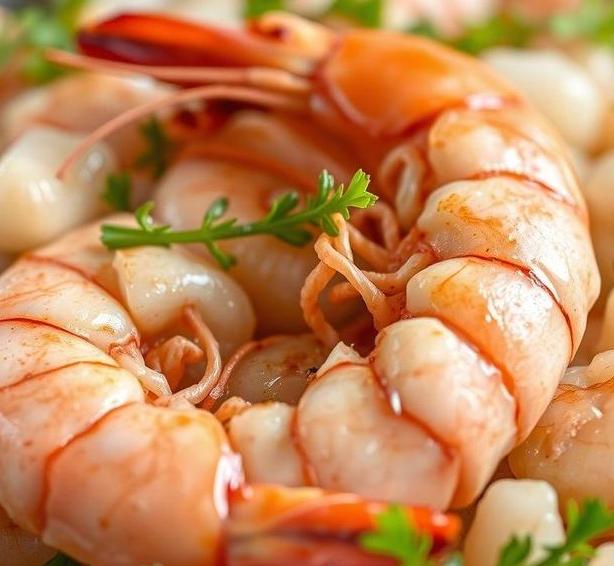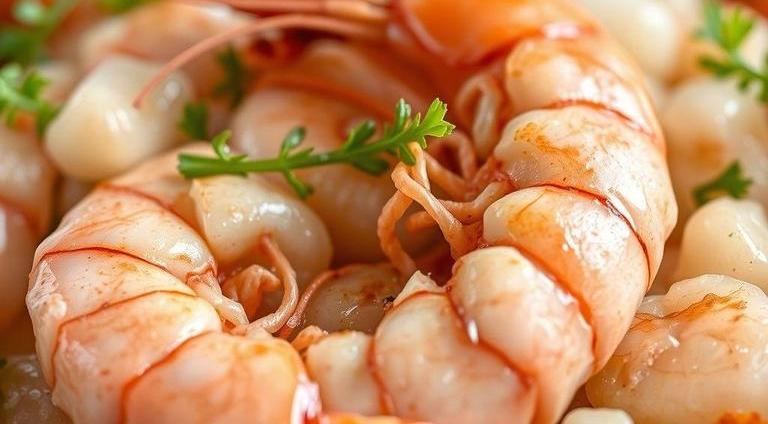Shrimp are a versatile, delicious seafood option that many of us enjoy in everything from stir-fries to seafood pastas. When cooked, shrimp are tender, succulent, and brimming with flavor. However, like all perishable foods, they come with a limited shelf life. Whether you’ve cooked up a big batch for a dinner party or just have some leftovers after a shrimp scampi night, knowing how long cooked shrimp lasts and how to store it properly is essential to avoid any risk of foodborne illness.
In this guide, we’ll explore how long cooked shrimp lasts, the common signs that indicate it’s no longer safe to eat, how to store it effectively, and expert tips to make sure you get the most out of your seafood. We’re going to dive into the nitty-gritty details to ensure you feel confident the next time you’re wondering if those shrimp sitting in your fridge are still good to eat.
Can Cooked Shrimp Go Bad?
The short answer is yes, cooked shrimp can go bad. Despite their delicious appeal, cooked shrimp is a highly perishable food, and if not handled or stored properly, it can spoil quickly. Like most seafood, shrimp are rich in proteins and moisture, both of which create a favorable environment for bacteria to grow once the shrimp are exposed to air and temperatures that aren’t ideal for preservation.
- Temperature and Time Sensitivity: Shrimp are particularly sensitive to temperature changes, and the faster they move out of the ’danger zone’ (40°F to 140°F), the better. Left at room temperature for too long, shrimp can quickly develop bacteria like Vibrio and Salmonella, which can lead to foodborne illnesses.
- What Causes Shrimp to Go Bad? Bacterial growth is the main culprit, but enzymes in the shrimp’s meat can also cause it to break down. Additionally, if cooked shrimp is exposed to oxygen or moisture, it can spoil faster.
Shelf Life For Cooked Shrimp

The shelf life of cooked shrimp can vary depending on several factors, including how it was cooked, how it was stored, and the conditions of its environment. But let’s break it down into clear timelines based on different storage methods.
- Refrigeration (Standard Fridge): If you store cooked shrimp in the refrigerator in an airtight container or a tightly wrapped bag, it can last for 3 to 4 days. This is the safest option for short-term storage.
- Freezing: For longer-term storage, freezing cooked shrimp is a great solution. If you want to keep them for weeks or even months, freezing them can extend their shelf life to about 2 to 3 months. However, the quality may degrade slightly over time, so it’s best to consume them within the first month for the best taste and texture.
- Room Temperature: If cooked shrimp are left out at room temperature (70°F or above) for more than 2 hours, they should be discarded. This is the general rule for all perishable foods – after two hours, bacteria can multiply to dangerous levels, and consuming shrimp left at room temperature could lead to food poisoning.
Common Signs Of Spoilage
Spoiled shrimp can be easy to spot if you know what to look for. Some signs are subtle, but they are important to check before you eat any leftover shrimp. Here’s a quick rundown of the common indicators that your cooked shrimp has gone bad:
- Off Smell: Fresh shrimp should have a clean, briny smell (think oceanic, but not overpowering). If the shrimp gives off a sour, ammonia-like, or overly fishy odor, it’s likely spoiled and should be tossed immediately.
- Slimy Texture: Fresh shrimp should be firm and slightly moist, but not slimy. If you notice a slippery or sticky film on the shrimp, it’s a sign that bacterial growth is occurring. Spoiled shrimp can feel slippery to the touch, almost like a coating has developed on the surface.
- Discoloration: The shrimp’s color should be a pale pink or beige, depending on how it was cooked. If the shrimp has turned dull, gray, or developed black spots or mold, it is no longer safe to eat.
- Soggy or Mushy Flesh: When shrimp are cooked properly, they have a slightly firm texture. If the flesh has become mushy or soggy, it’s an indicator of spoilage, especially if you stored it in the fridge for too long.
- Cloudy or Opaque Eyes: While cooked shrimp typically doesn’t have eyes still attached, if they do, a clouded, opaque appearance can be a red flag.
How To Store Cooked Shrimp?

Proper storage is the key to extending the shelf life of cooked shrimp and maintaining its quality. Let’s look at the best ways to store shrimp after cooking to ensure that it stays fresh for as long as possible.
-
Refrigerator Storage
- After cooking your shrimp, allow it to cool to room temperature before refrigerating. Do not leave shrimp at room temperature for more than 2 hours.
- Place the shrimp in an airtight container or resealable plastic bag to minimize exposure to air and moisture, both of which can accelerate spoilage.
- Label the container with the date so you can keep track of when it was cooked.
-
Freezer Storage
- If you plan on freezing shrimp, it’s best to place them in a vacuum-sealed bag to prevent freezer burn. Alternatively, wrap the shrimp tightly in plastic wrap, and then place it in a resealable freezer bag to reduce exposure to air.
- If freezing shrimp with shells on, ensure they’re thoroughly cleaned before storing. If you’ve already peeled them, you can still freeze them, but they might lose a bit of texture once thawed.
- When thawing frozen shrimp, do it slowly in the refrigerator overnight or under cold running water. Do not refreeze shrimp after it has been thawed.
- Avoid Storing with Sauces: If your shrimp has been cooked in a sauce, avoid storing it in the sauce. Sauces can alter the texture and may increase the risk of spoilage. It’s best to separate shrimp from the sauce before storing.
Expert Tips
Want to ensure your cooked shrimp stays as fresh and tasty as possible? Here are some expert tips to maximize its shelf life and quality:
- Use Ice Packs for Extra Freshness: If you’re transporting cooked shrimp from one location to another, especially for picnics or beach days, keep it in a cooler with ice packs. This helps maintain a safe temperature and prevents bacterial growth.
- Don’t Overcook Shrimp: Overcooking shrimp can make them dry and tough. But it also shortens their shelf life because the excess moisture evaporates, leaving the shrimp more vulnerable to bacterial growth. Aim to cook shrimp just until they turn opaque and pink.
- Freshness First: The fresher the shrimp when cooked, the longer it will last. Always buy shrimp from reputable sources and store it properly before cooking to ensure the best shelf life post-cooking.
- Plan for Leftovers: If you know you’re not going to eat the shrimp in the next few days, consider freezing it sooner rather than later. Freezing fresh shrimp right after cooking will preserve more of its flavor and texture than if it sits in the fridge for several days before freezing.
FAQs
Can Cooked Shrimp Go Bad In The Refrigerator?
Yes, cooked shrimp can go bad in the refrigerator. It should be stored in an airtight container and consumed within 3-4 days to maintain its quality and safety.
How Long Does Cooked Shrimp Last In The Fridge?
Cooked shrimp typically lasts 3 to 4 days in the fridge when stored properly in an airtight container.
Can You Freeze Cooked Shrimp To Extend Its Shelf Life?
Yes, cooked shrimp can be frozen to extend its shelf life. When stored properly in an airtight container or freezer bag, it can last for up to 6 months.
How Can You Tell If Cooked Shrimp Has Gone Bad?
Signs that cooked shrimp has gone bad include an off or sour smell, slimy texture, and discoloration. If the shrimp appears dry or mushy, it may have spoiled.
Can Cooked Shrimp Spoil At Room Temperature?
Yes, cooked shrimp can spoil if left out at room temperature for more than 2 hours. Bacteria can multiply quickly, leading to foodborne illness.
Is It Safe To Eat Cooked Shrimp After It Has Been Left Out Overnight?
No, it is not safe to eat cooked shrimp left out overnight. Bacteria can grow rapidly at room temperature, increasing the risk of food poisoning.
What Happens If You Eat Spoiled Cooked Shrimp?
Eating spoiled cooked shrimp can lead to food poisoning, which may cause symptoms such as nausea, vomiting, diarrhea, and stomach cramps.
Can Cooked Shrimp Be Stored In The Freezer For A Long Time?
While cooked shrimp can be stored in the freezer for up to 6 months, it’s best to consume it within 3 months for optimal flavor and texture.
What Should I Do If I Think My Cooked Shrimp Has Gone Bad?
If you suspect that your cooked shrimp has gone bad, it’s best to discard it. Don’t taste or consume it to avoid the risk of foodborne illness.
Can Cooked Shrimp Go Bad In The Microwave?
If cooked shrimp is reheated improperly in the microwave, it can dry out and lose its quality, but it typically won’t spoil unless it’s been stored too long or at improper temperatures.